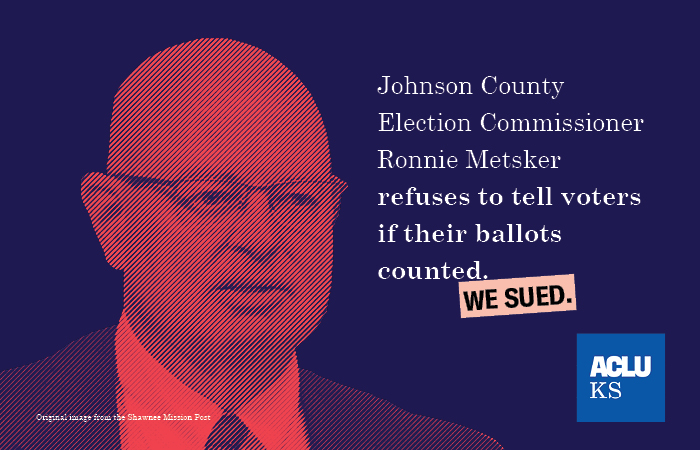
On September 17, 2018, the ACLU of Kansas filed a suit on behalf of Davis Hammet against Johnson County Election Commissioner Ronnie Metsker for refusing to tell Johnson County voters whether their votes counted.
On September 17, 2018, the ACLU of Kansas filed a suit on behalf of Davis Hammet, President of Loudlight, against Johnson County Election Commissioner Ronnie Metsker for Mr. Metsker's refusal to disclose a list of the names of Johnson County voters who cast a provisional ballot in the August 2018 primary election and a list of the names of Johnson County voters whose advance mail ballots were rejected because their signature did not match their voter record.
Loudlight is a civic engagement nonprofit focusing on expanding democracy and increasing voter turnout. Mr. Hammet's requests sought information recorded in the county's registration and poll books—including whether a voter cast a provisional ballot—which are both open to public inspection. On August 22, 2018, Mr. Hammet requested a list of the names of voters who cast provisional ballots and the reasons each voter was directed to vote provisionally, and Mr. Metsker responded several hours after the request with a refusal to release the records. On August 27, 2018, Mr. Hammet requested a list of the names of all advance mail ballot voters who votes were rejected due to a mismatch of signatures on their envelopes and voter record, and Mr. Metsker denied the request the same day, claiming that advance mail ballots became provisional ballots and were therefore closed from release.
In the lawsuit, the ACLU argues that the closure of the lists would be in conflict with the National Voter Registration Act, which requires states to maintain and make available for public inspection the names of registered voters and their voter participation history. The ACLU also cites multiple statutes in which the requested information should be accessible for review under the Kansas Open Records Act.
In his response to the suit, Mr. Metsker outlined a different interpretation of the law, one that conflicts with Kansas and federal laws expressly requiring disclosure of voter lists. Mr. Metsker’s denial of the records seems also to contradict the Secretary of State’s office practices, which include that an individual voter’s history is available online, including whether a voter cast a provisional ballot.
The lawsuit does not ask for any information related to who people voted for or for other private information. Rather, the suit seeks to obtain the necessary transparency about whose votes counted or if voters faced unnecessary barriers to voting in Johnson County. Nearly 2,350 Johnson County voters cast provisional ballots in the August 2018 primary. Only 1,176 of these were counted - nearly 900 of the provisional ballots were denied in their entirety. Johnson County also rejected 153 advance mail ballots because the signature on the envelope did not match their voter record.
Stay Informed
Sign up to be the first to hear about how to take action.
By completing this form, I agree to receive occasional emails per the terms of the ACLU’s privacy statement.
By completing this form, I agree to receive occasional emails per the terms of the ACLU’s privacy statement.
